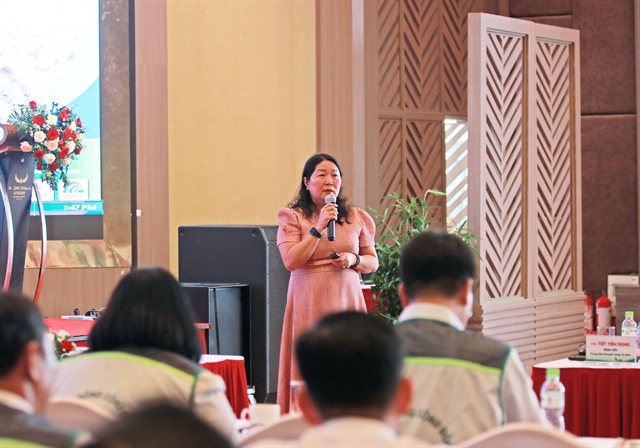 Society
Society


|
| Châu Thị Tuyết Hạnh of the Directorate of Fisheries and Fishery Surveillance, tells the forum titled “Applying technological advances to sustainable brackish-water shrimp farming in adaptation to climate change in the Mekong Delta” on Tuesday (October 29) about the strong global growth of the shrimp industry, particularly in Asia. VNA/VNS Photo |
CÀ MAU — The application of technological innovations and sustainable practices to brackish-water shrimp farming is of utmost importance, as the Mekong Delta faces increasing challenges from climate change, experts have said.
Châu Thị Tuyết Hạnh, representative of the Directorate of Fisheries and Fishery Surveillance, said at a forum on October 29 in Cà Mau Province that the global shrimp industry has been expanding rapidly, particularly in Asia. In 2024, global production was estimated at 5.88 million tonnes.
She said sustainable development has become a mandatory requirement, with increasingly strict standards on quality, food safety, social responsibility, and environmental protection.
“Việt Nam’s shrimp industry plays a pivotal role, contributing around 1.2 million tonnes annually for both export and domestic consumption. Vietnamese shrimp products are now available in 100 countries, with export revenues reaching US$3.9–4.3 billion,” Hạnh said.
“Shrimp accounts for 40–45 per cent of the nation’s total seafood exports and provides jobs for over three million people. Việt Nam is currently the world’s fourth largest shrimp supplier.”
However, she noted that the industry faces multiple challenges, including the impacts of climate change, environmental pollution, disease outbreaks, and international pressures related to food safety, technical barriers and tariffs.
Domestically, shrimp production continues to suffer from fragmented infrastructure and small-scale operations. The sector also faces persistent difficulties in traceability and quality control.
To address these issues, Việt Nam’s shrimp industry is shifting towards value-based, sustainable and climate-adaptive production, embracing the circular economy, digital technology and innovation. The goal is to develop brackish-water shrimp farming into a modern, efficient industry by 2030.
Experts from the Research Institute for Aquaculture No 2 said the Mekong Delta remains the country’s most important aquaculture region, particularly for brackish-water shrimp, but is also among the five most vulnerable deltas in the world to climate change.
Rising sea levels, saltwater intrusion, drought, and extreme weather are posing serious threats to shrimp farming. In recent years, salinity up rivers has affected shrimp–lotus and shrimp–rice farming, with freshwater shortages constraining intensive operations.
Unpredictable weather has led to unstable pond environments, making conditions conducive for disease outbreaks. Rising temperatures also stress shrimp, reducing their resistance and survival rates.
In response, integrated models such as shrimp–mangrove, shrimp–rice and improved extensive farming have proved effective. These systems not only help stabilise farmers’ livelihoods but also preserve ecosystems and reduce emissions.
The Government and international organisations are working together to expand these adaptive models across the delta.
According to Lê Đức Khoa of the Cà Mau Agricultural Extension Centre, the province has been at the forefront of developing ecological, digital and low-emission shrimp farming aligned with Government Resolution 120 on the sustainable development of the Mekong Delta.
Following the recent provincial reorganisation, Cà Mau continues to identify brackish-water shrimp as a key national product. Its models such as shrimp–rice, shrimp–forest and improved extensive farming have delivered tangible socio-economic benefits.
In 2024, its total shrimp output was around 566,000 tonnes, accounting for over 45 per cent of national production. With a modern processing and export system in place, it now ships its shrimp products to more than 90 countries.
However, challenges persist, including underdeveloped infrastructure, inconsistent broodstock quality, high input costs, volatile market prices, weak value chain linkages, and limited biosecurity management.
In particular, the availability of specific pathogen-free (SPF) and specific pathogen-resistant (SPR) shrimp broodstock still depends largely on imports, raising costs and production risks.
Lê Quốc Thanh, director of the National Agricultural Extension Centre, said environmental fluctuations caused by climate change directly affect aquaculture.
“Transforming production towards environmentally friendly, climate-resilient models is inevitable,” he said.
Research shows that converting saline intrusion zones into aquaculture areas, improving multi-stage intensive farming and integrating agriculture–forestry–fisheries systems can achieve high efficiency at relatively low cost while sustaining productivity and incomes.
Experts believe that through joint efforts and technological innovation, the Mekong Delta can lead the way in sustainable, climate-smart aquaculture, ensuring that the shrimp sector continues to thrive even as environmental challenges grow more complex. – VNS




